

A safe community to support your mental health, 24/7. What I have learned from my suicidal patients. 'Climate Despair' Is Making People Give Up on Life. How Science Is Unlocking the Secrets of Addiction. This story appears in the September 2017 issue of National Geographic magazine.
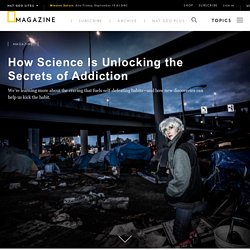
Patrick Perotti scoffed when his mother told him about a doctor who uses electromagnetic waves to treat drug addiction. “I thought he was a swindler,” Perotti says. Perotti, who is 38 and lives in Genoa, Italy, began snorting cocaine at 17, a rich kid who loved to party. Gabor Maté: How to Build a Culture of Good Health by Gabor Maté. “I never get angry,” says a character in one of Woody Allen’s movies.
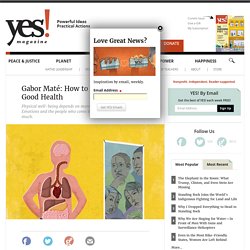
“I grow a tumor instead.” Much more scientific truth is captured in that droll remark than many doctors would recognize. Mainstream medical practice largely ignores the role of emotions in the physiological functioning of the human organism. Yet the scientific evidence abundantly shows that people’s lifetime emotional experiences profoundly influence health and illness. And, since emotional patterns are a response to the psychological and social environment, disease in an individual always tells us about the multigenerational family of origin and the broader culture in which that person’s life unfolds. Suicide rates are highest for men in their 50s and we're not sure why - Health.
Men take their own lives at about four times the rate women do, a number the Movember Foundation highlights this month in its campaign around men's mental health.
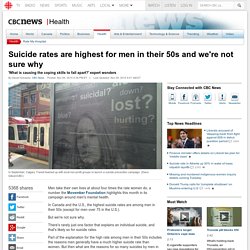
In Canada and the U.S., the highest suicide rates are among men in their 50s (except for men over 75 in the U.S.). Addiction is not a disease: A neuroscientist argues that it’s time to change our minds on the roots of substance abuse. The mystery of addiction — what it is, what causes it and how to end it — threads through most of our lives.
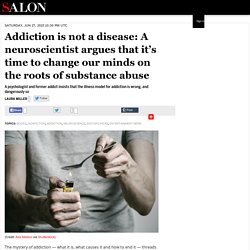
Experts estimate that one in 10 Americans is dependent on alcohol and other drugs, and if we concede that behaviors like gambling, overeating and playing video games can be addictive in similar ways, it’s likely that everyone has a relative or friend who’s hooked on some form of fun to a destructive degree. But what exactly is wrong with them? Can the Bacteria in Your Gut Explain Your Mood? Why We're All Addicted to Texts, Twitter and Google. The Likely Cause of Addiction Has Been Discovered, and It Is Not What You Think. It is now one hundred years since drugs were first banned — and all through this long century of waging war on drugs, we have been told a story about addiction by our teachers and by our governments.
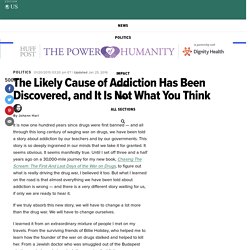
This story is so deeply ingrained in our minds that we take it for granted. It seems obvious. It seems manifestly true. Until I set off three and a half years ago on a 30,000-mile journey for my new book, Chasing The Scream: The First And Last Days of the War on Drugs, to figure out what is really driving the drug war, I believed it too. Childhood Guilt, Adult Depression?
Health New research shows differences in the brains of kids who show excessive guilty behavior, which may put them at risk for a host of mood disorders later in life.
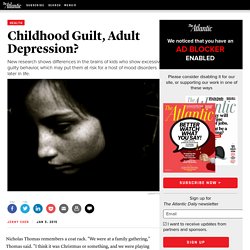
Most Confidential Crisis Lines Covertly Trace Calls, Send Police. Most crisis lines across the US trace calls and send police to people’s homes if crisis line staff feel someone might be at risk of suicide, according to an article in Suicide and Life-Threatening Behavior, the official journal of the American Association of Suicidology.
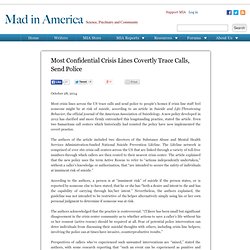
Suicides Rise Dramatically with Increasing Psychiatric Care. As the amount of involvement that people have with psychiatric professionals and psychiatric care increases, the likelihood that they will commit suicide rises steadily and dramatically, according to a study in Social Psychiatry and Psychiatric Epidemiology.
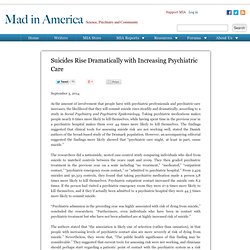
Taking psychiatric medications makes people nearly 6 times more likely to kill themselves, while having spent time in the previous year in a psychiatric hospital makes them over 44 times more likely to kill themselves. The findings suggested that clinical tools for assessing suicide risk are not working well, stated the Danish authors of the broad-based study of the Denmark population. However, an accompanying editorial suggested the findings more likely showed that “psychiatric care might, at least in part, cause suicide.” The researchers did a nationwide, nested case-control study comparing individuals who died from suicide to matched controls between the years 1996 and 2009. Doctor: ADHD Does Not Exist. The Sunday Edition with Michael Enright. 'Memories' pass between generations.
Behaviour can be affected by events in previous generations which have been passed on through a form of genetic memory, animal studies suggest.
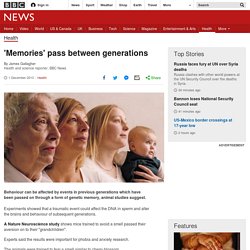
Experiments showed that a traumatic event could affect the DNA in sperm and alter the brains and behaviour of subsequent generations. A Nature Neuroscience study shows mice trained to avoid a smell passed their aversion on to their "grandchildren". Experts said the results were important for phobia and anxiety research. The animals were trained to fear a smell similar to cherry blossom. The team at the Emory University School of Medicine, in the US, then looked at what was happening inside the sperm.
Scientists have found that memories may be passed down through generations in... New research from Emory University School of Medicine, in Atlanta, has shown that it is possible for some information to be inherited biologically through chemical changes that occur in DNA.
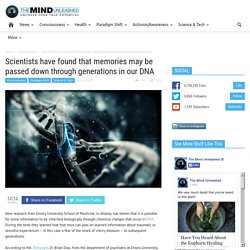
During the tests they learned that that mice can pass on learned information about traumatic or stressful experiences – in this case a fear of the smell of cherry blossom – to subsequent generations. According to the Telegraph, Dr Brian Dias, from the department of psychiatry at Emory University, said: ”From a translational perspective, our results allow us to appreciate how the experiences of a parent, before even conceiving offspring, markedly influence both structure and function in the nervous system of subsequent generations. “Such a phenomenon may contribute to the etiology and potential intergenerational transmission of risk for neuropsychiatric disorders such as phobias, anxiety and post-traumatic stress disorder.” Research link- Gut feelings: the future of psychiatry may be inside your stomach. Her parents were running out of hope. Their teenage daughter, Mary, had been diagnosed with a severe case of obsessive–compulsive disorder (OCD), as well as ADHD.
They had dragged her to clinics around the country in an effort to thwart the scary, intrusive thoughts and the repetitive behaviors that Mary felt compelled to perform. Even a litany of psychotropic medications didn’t make much difference. It seemed like nothing could stop the relentless nature of Mary’s disorder. The roots of mental illness. I’m going to delve into that topic that no one wants to talk about: suicide. It seems strange to me that one of the leading causes of death for young people is kept so far away from our eyes and ears.
Health - Why feeling more pain may be better for you. Psychology studies show painful experiences aren’t dictated by how long they go on for, and this could teach us an important lesson about everything from hospital operations to holidays, says Tom Stafford. When is the best treatment for pain more pain? When you're taking part in an experiment published by a Nobel prize winner and one of the leading lights in behavioural psychology, that is. The psychologist in question is Daniel Kahneman; the experiment described by the self-explanatory title of: When More Pain Is Preferred to Less: Adding a Better End. In the study, Kahneman and colleagues looked at the pain participants felt by asking them to put their hands in ice-cold water twice (one trial for each hand). News is bad for you – and giving up reading it will make you happier. In the past few decades, the fortunate among us have recognised the hazards of living with an overabundance of food (obesity, diabetes) and have started to change our diets.
But most of us do not yet understand that news is to the mind what sugar is to the body. News is easy to digest. The media feeds us small bites of trivial matter, tidbits that don't really concern our lives and don't require thinking. That's why we experience almost no saturation. Unlike reading books and long magazine articles (which require thinking), we can swallow limitless quantities of news flashes, which are bright-coloured candies for the mind.
News misleads. How to Land Your Kid in Therapy - Lori Gottlieb. Why Suicide Has Become an Epidemic. Suicide is a gender issue that can no longer be ignored. Each time suicide reaches the headlines our attention is directed at particular groups – middle-aged men, people in deprived areas or in certain professions. MSG and gluten intolerance: Is the nocebo effect to blame? Photo by Marina Helli/AFP/Getty Images. Sanity in a culture of mass murder. Specialisterne. Make room in the workplace for people with Autism.